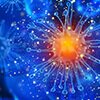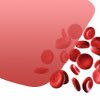Hematology Treatment in India

Hematology or haematology is the branch of medicine related to the study and treatment of blood. It is also the study of blood-forming organs and its components such as blood cells, hemoglobin, bone marrow, platelets, blood vessels, blood proteins, spleen and the mechanism of coagulation.
The human blood is made up of red blood cells, white blood cells, platelets and plasma. The red and white blood cells are produced in the bone marrow. The red blood cells account for 45% of whole blood and carry oxygen from the lungs to the body’s tissues and back to be exhaled. The white blood cells perform the important function of fighting infection. Platelets are small, colourless cells produced in the bone marrow and help blood to clot and thus stop bleeding. Plasma, which is made of 92% of water is the fluid part of the blood. Plasma contains vital proteins, mineral salts, sugars, fats, hormones and vitamins.
Given the crucial function that blood and its component perform, it is extremely important to eat nourishing foods. The quality of blood is also a reflection of the overall health of a person. A sample of blood holds vital information as regards the symptoms of any disease in the body. In hematological diagnosis, tests are done on the blood, blood proteins and blood-producing organs. These tests help detect various blood conditions or blood disorders such as infection, anemia, inflammation, hemophilia, blood-clotting disorders, leukemia and the body’s response to chemotherapy. Some of the common hematology tests are :
Full Blood Count Testing
White Blood Cells Testing
Red Blood Cells Testing
Hemoglobin Testing
Hematocrit and Platelets
Mono Screening
Vitamin B12 Deficiency Testing
Renal Profiling
Cholesterol Testing
Blood Glucose Testing
Also, blood may get infected from infusion, injection or transfusion. At times, there could be serious blood disorders such as blood cancer. Blood cancer results from the abnormal growth of a blood cell. Primarily, blood cancer starts in the bone marrow where blood is produced. Normally, stem cells in the bone marrow mature and develop into red and white blood cells and platelets. Any problem in this process, called ‘differentiation’, affects the production and functioning of regular blood cells. This then leads to blood cancer.
Severe disorders of the blood are treated under hematology and oncology. It is the branch of science that deals with the diagnosis, treatment and prevention of blood diseases (hematology) and cancer (oncology) and its research. A hematologist-oncologist is specialised in the prevention and treatment of blood diseases and cancers such as anemia, hemophilia, sickle-cell disease, leukemia and lymphoma.
Types of Blood Cancers
I. Leukemia -
Leukemia is the cancer that begins in the bone marrow and is caused when the production of white blood cells far exceeds that of red blood cells and platelets. These white blood cells become malignant and multiply inside the bone marrow.
Leukemia also has 4 main types
Chronic Myeloid Leukaemia (CML)
Chronic Lymphocytic Leukaemia (CLL)
Acute Myeloid Leukaemia (AML)
Acute Lymphoblastic Leukaemia (ALL)
The other types being:
Acute Promyelocytic Leukaemia (APL)
Hairy Cell Leukaemia (HCL)
Large Granular Lymphocytic Leukaemia (LGL)
T-Cell Acute Lymphoblastic Leukaemia (T-ALL)
Chronic Myelomonocytic Leukaemia (CMML)
II. Lymphoma -
This type of blood cancer affects lymphocytes, the infection-fighting cells of the immune system. When these lymphocytes change and grow out of control, one is said to have lymphoma. Lymphocytes are found in the circulation, spleen, tonsils and the lymph nodes.
The two main types of lymphoma are
Non-Hodgkin lymphoma
Hodgkin lymphoma
III. Myeloma -
This type of blood cancer affects plasma cell, a certain type of white blood cell. When the DNA of a plasma cell is damaged during development, the abnormal cell begins to multiply and metastasizes within the bone marrow. These abnormal plasma cells release a large amount of a single type of antibody, known as paraprotein. Myeloma results because of the build-up of abnormal cells in the bone marrow and presence of paraprotein.
Symptoms of Blood Cancer
Fever, chills
Prolonged fatigue and weakness
Reduced desire for food
Nausea
Severe weight loss
Night sweats
Bone/joint pain
Abdominal discomfort
Headaches
Dyspnea (shortness of breath)
Frequent infections
Itchy skin or skin rash
Swelling in the lymph nodes of the neck, underarms or groin.
Tests and Spread of Cancer
Some of the tests to diagnose blood cancer are :
Blood tests
Urinalysis
Lymph node biopsy
Genetic testing
Flow Cytometry
Spinal tap
Bone marrow testing
CT scan, PET scan and X-ray
Physical exam
Surgical lymph node removal (for examination)
After the diagnosis, the medical team undertakes ‘staging’. Staging is a process to understand the type, location and spread of the cancer. The staging criteria is different for different types of blood cancer.
Treatment
In the cure of cancer, the following treatments are usually offered :
Stem Cell Transplantation: In this treatment, healthy blood-forming stem cells are infused into the body. These stem cells may be collected from the bone marrow, circulating blood or the umbilical cord blood.
Chemotherapy: In this treatment, anti-cancer drugs are administered to interfere with and pause the growth of cancer cells in the body. Sometimes, chemotherapy for blood cancer involves giving several drugs together.
Radiation Therapy: Radiation therapy uses high levels of radiation to destroy cancer cells and shrink tumors.
Chemotherapy and radiation therapy may be given before a stem cell transplant.















